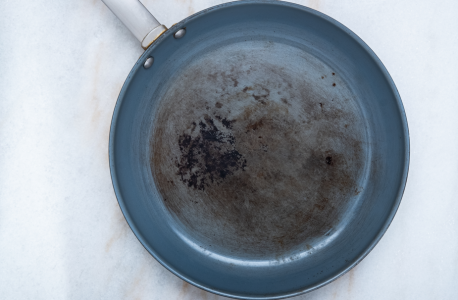Is your non-stick cookware poisoning you? Find out now!
By
- Replies 6
In the kitchens of many Australian seniors, non-stick cookware is a staple, prized for its convenience and ease of use. But lurking behind the glossy, easy-to-clean surface, there have been whispers and worries about the safety of these kitchen essentials. Are these concerns justified, or is it just a lot of hot air? Let's delve into the facts and find out if your non-stick pots and pans are as harmless as they seem.
The heart of the issue lies in the use of per- and poly-fluoroalkyl substances (PFAS) in the coatings of non-stick cookware. These 'forever chemicals' have earned their nickname due to their persistence in the environment and their resistance to breaking down over time. PFAS have been used in a variety of household products, from waterproof clothing to anti-staining treatments for fabrics and carpets. But it's their application in cookware that has raised eyebrows and concerns among consumers.
So, what's the deal with non-stick pans? Many of these products are coated with polytetrafluoroethylene (PTFE), a type of PFAS better known by the brand name Teflon. Oliver Jones, a professor of chemistry at RMIT, explains that PTFE is favoured for its durability and, of course, its non-stick properties. According to Professor Jones, PTFE-coated non-stick pans are generally safe to use, provided they're not subjected to extremely high temperatures.
When heated above 260 degrees Celsius, the PTFE coating can start to deteriorate, but significant degradation doesn't occur until temperatures reach around 349C. Studies have examined the fumes released when Teflon is overheated, but the temperatures required are typically higher than the smoke points of most cooking oils. In other words, unless you're seeing smoke, you're unlikely to reach those dangerous temperatures. And even if you did, the effects on humans are usually minor, especially with proper kitchen ventilation.
But what about when your non-stick pan gets scratched? Could we be ingesting harmful PFAS from damaged cookware? While research on this specific scenario is limited, Professor Jones reassures that Teflon is inert, meaning that even if it flakes off, it shouldn't pose a health risk. However, as a precaution, it's wise to avoid using damaged non-stick pots and pans. If you notice the coating peeling off, it's probably time to consider a replacement.
If you're in the market for new cookware, there are alternatives to non-stick PTFE-coated pans. Stainless steel, cast iron, and copper are all excellent options. To prevent scratching your non-stick pans, opt for wooden utensils over metal ones. Additionally, some companies offer non-stick ceramic coatings that are PFAS-free.
Despite the concerns, PTFE isn't considered a 'chemical of concern' for humans by Australian regulators. Unlike other PFAS chemicals, PTFE doesn't dissolve in water and isn't metabolized by the body, meaning it won't be absorbed. Furthermore, strict standards are in place to ensure that Teflon products do not contain PFOA, another PFAS chemical historically used in Teflon's manufacturing process, but it is not present in the final product.
It's also worth noting that PFAS are ubiquitous in the environment, making it nearly impossible to avoid them entirely. Professor Nicholas Buckley from the University of Sydney, who chaired the expert health panel advising the Australian government on PFAS, points out that we're exposed to these chemicals in minuscule amounts every day. From household dust to the food we eat, PFAS are everywhere, albeit in very low concentrations.
While the headlines about PFAS can be alarming, experts like Professor Buckley and Professor Jones suggest that there are far more pressing environmental health concerns, such as air pollution, which has a more immediate and significant impact on health. They recommend focusing on lifestyle changes like increasing exercise and reducing alcohol consumption for a more substantial health benefit.
 In conclusion, while it's essential to be informed about the materials in our cookware, the evidence suggests that non-stick pots and pans coated with PTFE are safe for everyday use when used correctly. So, dear members of the Seniors Discount Club, you can breathe a sigh of relief and continue to enjoy the convenience of your non-stick cookware. But remember, if your pans are starting to show signs of wear and tear, it might be time to shop for a new set. As always, we'd love to hear your thoughts and experiences on this topic in the comments below!
In conclusion, while it's essential to be informed about the materials in our cookware, the evidence suggests that non-stick pots and pans coated with PTFE are safe for everyday use when used correctly. So, dear members of the Seniors Discount Club, you can breathe a sigh of relief and continue to enjoy the convenience of your non-stick cookware. But remember, if your pans are starting to show signs of wear and tear, it might be time to shop for a new set. As always, we'd love to hear your thoughts and experiences on this topic in the comments below!
The heart of the issue lies in the use of per- and poly-fluoroalkyl substances (PFAS) in the coatings of non-stick cookware. These 'forever chemicals' have earned their nickname due to their persistence in the environment and their resistance to breaking down over time. PFAS have been used in a variety of household products, from waterproof clothing to anti-staining treatments for fabrics and carpets. But it's their application in cookware that has raised eyebrows and concerns among consumers.
So, what's the deal with non-stick pans? Many of these products are coated with polytetrafluoroethylene (PTFE), a type of PFAS better known by the brand name Teflon. Oliver Jones, a professor of chemistry at RMIT, explains that PTFE is favoured for its durability and, of course, its non-stick properties. According to Professor Jones, PTFE-coated non-stick pans are generally safe to use, provided they're not subjected to extremely high temperatures.
When heated above 260 degrees Celsius, the PTFE coating can start to deteriorate, but significant degradation doesn't occur until temperatures reach around 349C. Studies have examined the fumes released when Teflon is overheated, but the temperatures required are typically higher than the smoke points of most cooking oils. In other words, unless you're seeing smoke, you're unlikely to reach those dangerous temperatures. And even if you did, the effects on humans are usually minor, especially with proper kitchen ventilation.
But what about when your non-stick pan gets scratched? Could we be ingesting harmful PFAS from damaged cookware? While research on this specific scenario is limited, Professor Jones reassures that Teflon is inert, meaning that even if it flakes off, it shouldn't pose a health risk. However, as a precaution, it's wise to avoid using damaged non-stick pots and pans. If you notice the coating peeling off, it's probably time to consider a replacement.
If you're in the market for new cookware, there are alternatives to non-stick PTFE-coated pans. Stainless steel, cast iron, and copper are all excellent options. To prevent scratching your non-stick pans, opt for wooden utensils over metal ones. Additionally, some companies offer non-stick ceramic coatings that are PFAS-free.
Despite the concerns, PTFE isn't considered a 'chemical of concern' for humans by Australian regulators. Unlike other PFAS chemicals, PTFE doesn't dissolve in water and isn't metabolized by the body, meaning it won't be absorbed. Furthermore, strict standards are in place to ensure that Teflon products do not contain PFOA, another PFAS chemical historically used in Teflon's manufacturing process, but it is not present in the final product.
It's also worth noting that PFAS are ubiquitous in the environment, making it nearly impossible to avoid them entirely. Professor Nicholas Buckley from the University of Sydney, who chaired the expert health panel advising the Australian government on PFAS, points out that we're exposed to these chemicals in minuscule amounts every day. From household dust to the food we eat, PFAS are everywhere, albeit in very low concentrations.
While the headlines about PFAS can be alarming, experts like Professor Buckley and Professor Jones suggest that there are far more pressing environmental health concerns, such as air pollution, which has a more immediate and significant impact on health. They recommend focusing on lifestyle changes like increasing exercise and reducing alcohol consumption for a more substantial health benefit.
Key Takeaways
- Non-stick cookware, often coated with polytetrafluoroethylene (PTFE), commonly known by the brand name Teflon, is safe to use under normal cooking temperatures but should not be used at very high temperatures above 260 degrees Celsius.
- Scratched or damaged non-stick cookware is a concern for some due to potential exposure to PFAS; however, PTFE is inert and ingestion of flakes is unlikely to be harmful, though it is advisable to replace damaged cookware as a precaution.
- The Australian government's PFAS Taskforce and experts indicate that PTFE, the substance used in non-stick cookware like Teflon, is non-toxic and not metabolised by the body, making it not a chemical of concern to human health.
- Despite the ubiquity of PFAS in the environment, health experts suggest that there are far more significant environmental health concerns, such as air pollution, and that the potential health risks from PFAS in non-stick cookware are minimal compared to these larger issues.








